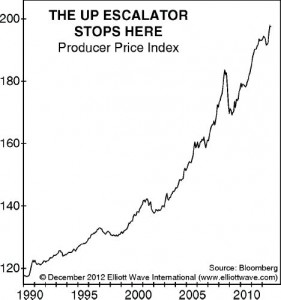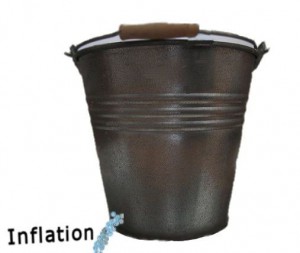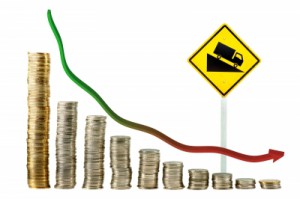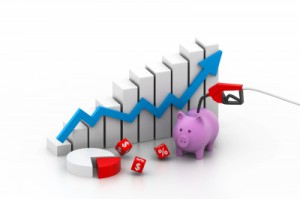The majority of the inflation from 2012 occurred in the first quarter with extremely high monthly rates of inflation. Overall in 2012 there were 6 very inflationary months (on a monthly basis), 5 slightly deflationary months and 1 very deflationary month (November). The first month of 2013 started out pretty inflationary but the first quarter of the year generally shows the most inflation for the entire year. See Table … [Read more...]
The World Is in the Grip of a Bear Market–Have You Noticed?
Global Markets, Economies Mired in Early Stages of Biggest Disaster Ever By Elliott Wave International The following is a sample from Elliott Wave International's new 40-page report, The State of the Global Markets -- 2013 Edition: The Most Important Investment Report You'll Read This Year. This article was originally published in Robert Prechter's September 2012 Elliott Wave Theorist. Global markets and economies are mired in the early stages of the biggest disaster ever. Most people think both areas are in the early stages of a prolonged recovery, but in fact they are on the cusp of the second downturn, which will be of epic proportion. The world is in the grip of a bear market. … [Read more...]
The Impact of Inflation on Savings
The obvious impact of inflation on your savings is that the purchasing power is erroded. This means that if you stash $100 under the mattress today and inflation is 3% per year when you come back a year from now your $100 will buy 3% less stuff. Put another way you would need $103 to buy the same amount of goods a year later. When you extend this to 10 years you might think that it would mean that you would need $130 to buy the same amount of goods but because of the effects of compounding you would actually need $134.39. You can use the Retirement Planning Calculator to calculate the impact of inflation on your savings. As time goes on the impact of "only" 3% inflation compounds making … [Read more...]
The Impact of Inflation on Retirement Planning
Planning for retirement is difficult enough without having to worry about inflation. There is a lot to consider when you stop working a regular job. Do you plan on living where you are now. Do you want a change of scenery? Would you prefer a place with less maintenance or a place where you can have a big garden or a workshop where you can build things? There of course the financial aspects to consider as well. Will your retirement savings be adequate to provide the type of lifestyle you desire? There are a variety of Retirement Planning Calculators that can help you try to figure out how much you will need to save to have a happy retirement. You need to estimate your expenses once you are … [Read more...]
The Secret Word: Deflation – And the Next Five Years of Financial Turmoil
The following is a sample from Elliott Wave International's new 40-page report, The State of the Global Markets - 2013 Edition: The Most Important Investment Report You'll Read This Year. This article was originally published in Robert Prechter's July 2012 Elliott Wave Theorist. In the first five months of 2012, there were 20 times as many Google searches on "inflation" as there were on "deflation." This is down from a ratio of 50 times in June 2008. If any theme has been overdone over the past six years, it is the theme of inevitable inflation if not hyperinflation. Inflation reigned for 75 years, from 1933 to 2008. People are so used to it that they cannot imagine the opposite … [Read more...]
Costs of Inflation in Business
The current UK inflation rate is 2.7 percent. So what does this mean? The term inflation refers to a general rise in the price of a goods and services. This means the price of a basket of goods this year are, on average, 2.7 percent more expensive than last year. See Also: What is the Real Definition of Inflation? Costs of Inflation Most countries adopt a inflation targeting policy; for example, the Bank of England targets the inflation rate at 2 percent. Generally, governments prefer inflation so they can repay their debts with money that is worth less. If they had their way they would inflate their debts away at a much higher rate than 2%. So why is high inflation deemed a bad … [Read more...]
U.S. Foreign Exchange and The Chinese Currency Exchange Rate
U.S. Foreign Exchange The number of international corporations and financial professionals that follow the ever-changing ratio of U.S. dollars to Chinese Yuan has increased and expanded beyond its borders. This is an indication of just how critical the trade relationship that binds the world's two largest economies has become. Although the relationship between the United States, Canada and Mexico continues to be even more robust than the Sino-American arrangement, the consumer economy of the United States is heavily dependent upon smooth flows of goods from the workshops of China to the Pacific ports of California and Washington State. In many ways, the continued harmonious economic … [Read more...]
Gargantuan and Growing: The US Debt Figure You’ve Probably Never Heard Of
The widely reported $16.1 trillion federal US debt is a drop in the bucket Financial transparency is a must for U.S. publicly traded companies. But if the federal government had to abide by those same regulations, more Americans would know that the often-reported $16.1 trillion federal US debt doesn't come close to the truth about the nation's liabilities. In a Nov. 26 Wall Street Journal opinion piece, a former chairman of the Securities and Exchange Commission and a former chairman of the House Ways & Means Committee write: The actual liabilities of the federal government -- including Social Security, Medicare, and federal employees' future retirement benefits -- already exceed … [Read more...]
Australian Banks Rated As Low Risk
Australian Banks and Economic Environment Positive In a world analysis Australian banks have been found to pose a low degree of risk to the global financial system. According to Dr Robert Engle, the 2003 winner of the Nobel Prize in Economics and a professor of finance at Stern School of Business at New York University, the Australian banking system is robust and capitalized enough to endure another financial crisis. He said the economic environment was positive from an Australian perspective and that the liquidity measures that had been implemented were proving to be effective. The comments were made as part of Dr Engle’s presentation on systemic risk within the worldwide financial … [Read more...]
What are “Foreign Exchange Reserves”?
Will the U.S. Dollar Be Replaced as the World's Reserve Currency? Foreign Exchange Reserves are foreign money held by International banks for use in international trade and in an effort to diversify their holdings and hedge against the inflation of their own currency. The most common items bought and sold with their foreign exchange reserves are oil and gold. Up until 1944 the asset of choice was gold and it was used as the medium of exchange between countries to settle their debts. But in July 1944, delegates from the 44 Allied nations gathered in Bretton Woods, New Hampshire., and made the U.S. dollar the reserve currency of the world. At that time, the dollar was pegged at $35 per ounce … [Read more...]










